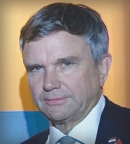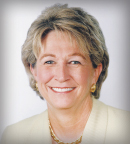The Prevent Cancer Foundation has honored Matthijs Oudkerk, PhD, MD, MSc, with the prestigious James L. Mulshine, MD, International Leadership Award. Dr. Oudkerk is Professor of Radiology at the University of Groningen and Chief Scientific Officer of the Institute for Diagnostic Accuracy in the Netherlands.

Matthijs Oudkerk, PhD, MD, MSc
At the Quantitative Imaging Workshop XX, Dr. Oudkerk received this recognition for his pioneering work in the field of cancer prevention and research. During the presentation, his colleagues shared highlights of his career. In a discussion that followed, Dr. Oudkerk reflected on recent advances in lung cancer screening, including innovations in image-based diagnoses and biomarker development.
Spearheading Innovation
According to David F. Yankelevitz, MD, Professor of Radiology, and Director of the Lung Biopsy Service at the Icahn School of Medicine at Mount Sinai, one of Dr. Oudkerk’s significant legacies is his role as co-principal investigator for the radiologic aspects of the NELSON trial.1
Despite the comprehensive research and significant investment in the I-ELCAP and National Lung Screening Trials, neither study was able to sway global opinion about the viability of lung cancer screening, said Dr. Yankelevitz. The NELSON trial, on the other hand, accomplished what seemed to be a herculean task, successfully demonstrating the mortality benefit of lung cancer screening for people at high risk in Europe. Findings from the trial led to 27 nations, with a total population of 750 million people, recognizing the value of lung cancer screening. Those eligible for lung cancer screening are smokers or former smokers with significant tobacco exposure (> 20 pack-years) after they reach age 50.

David F. Yankelevitz, MD
“The NELSON trial can take credit for putting lung cancer screening on the global map and shifting its status from debate to acceptance worldwide,” said Dr. Yankelevitz. “The NELSON trial’s approach is also credited with substantial innovations in imaging, positioning volumetric analysis as a key driver for the future success of lung cancer screening.”
Dr. Oudkerk has also been the principal investigator on several other significant trials, including the ROBINSCA study on early detection of cardiovascular disease and the 4ITLR study on implementation of screening and early detection of lung cancer, cardiovascular disease, and emphysema in Europe, which began enrollment in 2022.2 With a focus not just on lung cancer screening, these studies aim to evaluate the associated benefits of screening for other tobacco-related diseases, according to Dr. Yankelevitz.
Additionally, under Dr. Oudkerk’s guidance, the Nelcin-B3 study in China explored multiple screenings simultaneously.3 Studies such as Nelcin-B3 will strongly influence how lung cancer screening evolves to encompass a broader array of diseases, Dr. Yankelevitz added.
Biomarker Development
With respect to his ongoing research, Dr. Oudkerk noted that numerous biomarkers are being investigated and monitored for their potential use in a clinical setting, representing powerful tools in the treatment of diseases such as cancer. These biomarkers may potentially allow for a more precise, personalized approach to treatment.
Biomarker development is especially critical for radiology, according to Dr. Oudkerk, who noted this research may “bring about a world where providers can routinely make clinical decisions based on information obtained from thoracic CT scans.”
Of note, Dr. Oudkerk added, when compared with previous tools, new biomarkers offer the possibility of meaningful clinical decisions to be made based on a single data point rather than a series of data points. However, Dr. Oudkerk also underscored the need to “prove research valid before making forward progress.”
Understanding Different Perspectives
Furthermore, Dr. Oudkerk emphasized the importance of understanding the problems researchers and medical scientists face from different perspectives, including from policymakers and startups.4 He noted significant differences in approaches to health care in China, for example, where screening is considered a “health check,” vs in the United States, where there is “enormous impetus for getting things reimbursed.” In Europe, which “falls somewhere between these two approaches,” said Dr. Oudkerk, there is “too much emphasis on proving everything before we start anything.”

Carolyn “Bo” Aldigé
Dr. Oudkerk also touched on the social, legal, and ethical aspects of his work, discussing the necessity for resilient, evidence-based outcomes to convince policymakers of the efficacy and cost-effectiveness of preventive measures against lung cancer. In Europe, he said, screening has an “extremely negative profile, so we focus more on early detection.” Dr. Oudkerk recommended differentiating health checks, which could be completely commercial and performed privately, from early detection and surveillance in defined high-risk populations.
“What makes Professor Oudkerk’s accomplishments so exceptional is his unwavering commitment to implementing equitable lung cancer screening services not only across Europe, but around the world,” said Prevent Cancer Foundation founder Carolyn “Bo” Aldigé in a press release. “His work has saved and will continue to save countless lives by helping people detect lung cancer early, which leads to better outcomes.”
DISCLOSURE: Dr. Oudkerk reported no conflicts of interest. Dr. Yankelevitz owns stock in Accumetra; has served as a consultant or advisor for Grail; and has a licensing agreement between Cornell University and General Electric for management of various lung abnormalities including lung nodules.
REFERENCES
1. de Koning HJ, van der Aalst CM, de Jong PA, et al: Reduced lung-cancer mortality with volume CT screening in a randomized trial. N Engl J Med 382:503-513, 2020.
2. Vonder M, van der Aalst CM, Vliegenthart R, et al: Coronary artery calcium imaging in the ROBINSCA trial: Rationale, design, and technical background. Acad Radiol 25:118-128, 2018.
3. Yang X, Dorrius MD, Jiang W, et al: Association between visual emphysema and lung nodules on low-dose CT scan in a Chinese Lung Cancer Screening Program (Nelcin-B3). Eur Radiol 32:8162-8170, 2022.
4. Oudkerk M, Liu S, Heuvelmans M, et al: Lung cancer LDCT screening and mortality reduction—evidence, pitfalls and future perspectives. Nat Rev Clin Oncol 18:135-151, 2021.

